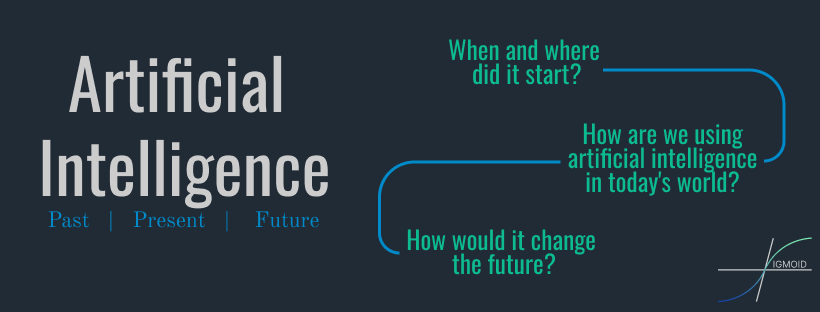Artificial Intelligence: Past, Present, and Future

Artificial intelligence is the ability of machines to perform certain tasks, which need the intelligence showcased by humans and animals. This definition is often ascribed to Marvin Minsky and John McCarthy from the 1950s, who were also known as the fathers of the field.
When and where did it start?
AI was a term first coined at Dartmouth College in 1956. Cognitive scientist Marvin Minsky was optimistic about the technology’s future. The 1974–1980 saw government funding in the field drop, a period known as “AI winter”, when several criticized progress in the field.
However, the fervour was revived afterwards in the 1980s when the British government started funding the technology again, especially because they were worried about competition with the Japanese. In 1997, IBM’s Deep Blue began the first computer to beat a Russian Grandmaster, making history.
How are we using artificial intelligence in today’s world?
AI is not a futuristic vision, but rather something that is here today and being integrated with and deployed into a variety of sectors. This includes fields such as finance, national security, health care, criminal justice, transportation, and smart cities. There are numerous examples where AI already is making an impact on the world and augmenting human capabilities in significant ways.
One of the reasons for the growing role of AI is the tremendous opportunities for economic development that it presents. A project undertaken by PriceWaterhouseCoopers estimated that “artificial intelligence technologies could increase global GDP by $15.7 trillion, a full 14%, by 2030.” That includes advances of $7 trillion in China, $3.7 trillion in North America, $1.8 trillion in Northern Europe, $1.2 trillion for Africa and Oceania, $0.9 trillion in the rest of Asia outside of China, $0.7 trillion in Southern Europe, and $0.5 trillion in Latin America. China is making rapid strides because it has set a national goal of investing $150 billion in AI and becoming the global leader in this area by 2030.
Meanwhile, a McKinsey Global Institute study of China found that “AI-led automation can give the Chinese economy a productivity injection that would add 0.8 to 1.4 percentage points to GDP growth annually, depending on the speed of adoption.” Although its authors found that China currently lags the United States and the United Kingdom in AI deployment, the sheer size of its AI market gives that country tremendous opportunities for pilot testing and future development.
How would it change the future?
As with most changes in life, there will be positive and negative impacts on society as artificial intelligence continues to transform the world we live in. How that will balance out is anyone’s guess and up for much debate and for many people to contemplate. As optimists at heart, we believe the changes will mostly be good but could be challenging for some. Here are some of the challenges that might be faced (and we should be thinking about how to address them now) as well as several of the positive impacts artificial intelligence will have on society.
Artificial intelligence will definitely cause our workforce to evolve. The alarmist headlines emphasise the loss of jobs to machines, but the real challenge is for humans to find their passion with new responsibilities that require their uniquely human abilities. According to PwC, 7 million existing jobs will be replaced by AI in the UK from 2017–2037, but 7.2 million jobs could be created. This uncertainty and the changes to how some will make a living could be challenging.
Made with ❤ by Sigmoid.
Follow us on Facebook, Instagram, and LinkedIn:
https://www.facebook.com/sigmoidAI
https://www.instagram.com/sigmo.ai/
https://www.linkedin.com/company/sigmoid/
For more information about the statistics we recommend the source:
https://www.brookings.edu/research/how-artificial-intelligence-is-transforming-the-world/
